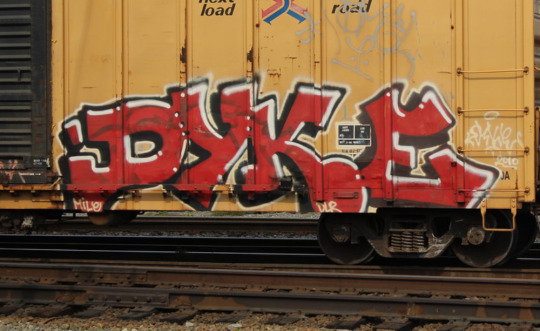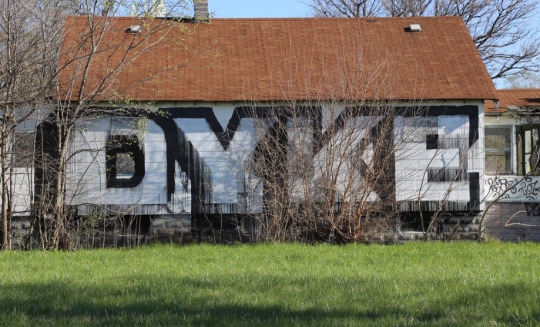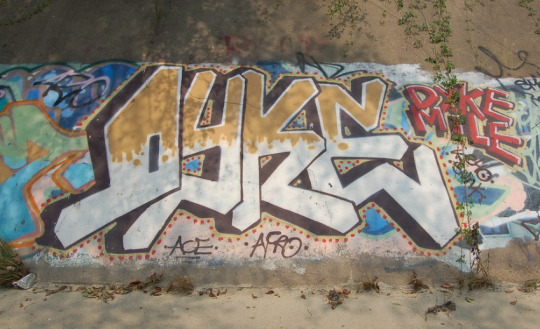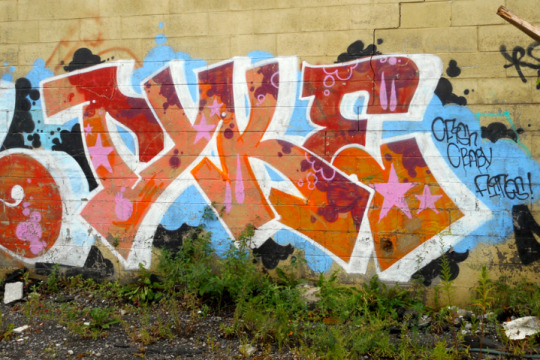Text
when spike does bad things he is a fictional character subjected to the whims of joss whedon and when he does good things he’s spike my friend spike who’s real and my friend
697 notes
·
View notes
Text


The Dyke Project manifesto printed on the back of estradiol and testogel boxes
11K notes
·
View notes
Text
by far the best part of grocery shopping is the little babies. i was carefully selecting mushrooms when i felt upon me a piercing gaze and looked up to see a very chubby and very red-cheeked baby staring intently at me from a grocery cart with a slightly furrowed brow, hand clutching an apple for dear life. i wiggled a mushroom at her and she gasped and kept staring. i turned back to the mushrooms and heard a shriek. i turned around and the baby stared in anticipation. i wiggled another mushroom and she shrieked again in delight. she looked down at the apple in her hand, considering it for a moment. fair-minded as she was, she decided it would only be right to wiggle produce at me in return, and she held up the apple and shook it with all her might. i think i could live forever now
102K notes
·
View notes
Text
8K notes
·
View notes
Text
daily reminder that boycotting is not a moral stance but a political strategy, so the whole “there’s no ethical consumption under capitalism” argument is not the gotcha you think it is
you can refer to BDS if you’d like a list of companies to focus your efforts on. you can refer to this website if you’d like to become more conscientious about what you’re buying and check for brands/products to avoid.
*please note that i am a palestinian who has been boycotting my entire life. do not try to explain to me in the tags or reblogs or replies what a targeted boycott is or complain about giving up your comfort for something that you (incorrectly) believe does not make an impact. being quiet is free. exercise your right to remain silent today.
11K notes
·
View notes
Text

first time making brisket myself 👨🍳 everyone look at my brisket it’s delicious
10 notes
·
View notes
Text
and if you feel comfortable sharing what song(s), let us know in the tags!
7K notes
·
View notes
Text
post for if they make the jeremy allen white bruce springsteen movie and it's good and i like it: the movies are back!
post for if they make the jeremy allen white bruce springsteen movie and it's bad but in an enjoyable way: everyone needs to lighten up omg do none of you know how to have fun
post for if they make the jeremy allen white bruce springsteen movie and it's bad in an unenjoyable way: these cashgrab nothing biopics need to be #canceled
2K notes
·
View notes
Text

He will play ben edlund in the David fincher dramatization of the supernatural bts
#i think abt this post All The Time#and if i were david fincher i would do a scene of ben edlund's band doing a gig so as to make chris pine wear the kitty ears & tiger makeup
2K notes
·
View notes
Text






wanted all my horses in one basket, as it were
25K notes
·
View notes
Note
When you tag things “#abolition”, what are you referring to? Abolishing what?
Prisons, generally. Though not just physical walls of formal prisons, but also captivity, carcerality, and carceral thinking. Including migrant detention; national border fences; indentured servitude; inability to move due to, and labor coerced through, debt; de facto imprisonment or isolation of the disabled or medically pathologized; privatization and enclosure of land; categories of “criminality"; etc.
In favor of other, better lives and futures.
Specifically, I am grateful to have learned from the work of these people:
Ruth Wilson Gilmore on “abolition geography”.
Katherine McKittrick on "imaginative geographies"; emotional engagement with place/landscape; legacy of imperialism/slavery in conceptions of physical space and in devaluation of other-than-human lifeforms; escaping enclosure; plantation “afterlives” and how plantation logics continue to thrive in contemporary structures/institutions like cities, prisons, etc.; a “range of rebellions” through collaborative acts, refusal of the dominant order, and subversion through joy and autonomy.
Macarena Gomez-Barris on landscapes as “sacrifice zones”; people condemned to live in resource extraction colonies deemed as acceptable losses; place-making and ecological consciousness; and how “the enclosure, the plantation, the ship, and the prison” are analogous spaces of captivity.
Liat Ben-Moshe on disability; informal institutionalization and incarceration of disabled people through physical limitation, social ostracization, denial of aid, and institutional disavowal; and "letting go of hegemonic knowledge of crime”.
Achille Mbembe on co-existence and care; respect for other-than-human lifeforms; "necropolitics" and bare life/death; African cosmologies; historical evolution of chattel slavery into contemporary institutions through control over food, space, and definitions of life/land; the “explicit kinship between plantation slavery, colonial predation, and contemporary resource extraction” and modern institutions.
Robin Maynard on "generative refusal"; solidarity; shared experiences among homeless, incarcerated, disabled, Indigenous, Black communities; to "build community with" those who you are told to disregard in order "to re-imagine" worlds; envisioning, imagining, and then manifesting those alternative futures which are "already" here and alive.
Leniqueca Welcome on Caribbean world-making; "the apocalyptic temporality" of environmental disasters and the colonial denial of possible "revolutionary futures"; limits of reformism; "infrastructures of liberation at the end of the world."; "abolition is a practice oriented toward the full realization of decolonization, postnationalism, decarceration, and environmental sustainability."
Stefano Harney and Fred Moten on “the undercommons”; fugitivity; dis-order in academia and institutions; and sharing of knowledge.
AM Kanngieser on "deep listening"; “refusal as pedagogy”; and “attunement and attentiveness” in the face of “incomprehensible” and immense “loss of people and ecologies to capitalist brutalities”.
Lisa Lowe on "the intimacies of four continents" and how British politicians and planters feared that official legal abolition of chattel slavery would endanger Caribbean plantation profits, so they devised ways to import South Asian and East Asian laborers.
Ariella Aisha Azoulay on “rehearsals with others’.
Phil Neel on p0lice departments purposely targeting the poor as a way to raise municipal funds; the "suburbanization of poverty" especially in the Great Lakes region; the rise of lucrative "logistics empires" (warehousing, online order delivery, tech industries) at the edges of major urban agglomerations in "progressive" cities like Seattle dependent on "archipelagos" of poverty; and the relationship between job loss, homelessness, gentrification, and these logistics cities.
Alison Mountz on migrant detention; "carceral archipelagoes"; and the “death of asylum”.
Pedro Neves Marques on “one planet with many worlds inside it”; “parallel futures” of Indigenous, Black, disenfranchised communities/cosmologies; and how imperial/nationalist institutions try to foreclose or prevent other possible futures by purposely obscuring or destroying histories, cosmologies, etc.
Peter Redfield on the early twentieth-century French penal colony in tropical Guiana/Guyana; the prison's invocation of racist civilization/savagery mythologies; and its effects on locals.
Iain Chambers on racism of borders; obscured and/or forgotten lives of migrants; and disrupting modernity.
Paulo Tavares on colonial architecture; nationalist myth-making; and erasure of histories of Indigenous dispossession.
Elizabeth Povinelli on "geontopower"; imperial control over "life and death"; how imperial/nationalist formalization of private landownership and commodities relies on rigid definitions of dynamic ecosystems.
Kodwo Eshun on African cosmologies and futures; “the colonial present”; and imperialist/nationalist use of “preemptive” and “predictive” power to control the official storytelling/narrative of history and to destroy alternatives.
Tim Edensor on urban "ghosts" and “industrial ruins”; searching for the “gaps” and “silences” in the official narratives of nations/institutions, to pay attention to the histories, voices, lives obscured in formal accounts.
Megan Ybarra on place-making; "site fights"; solidarity and defiance of migrant detention; and geography of abolition/incarceration.
Sophie Sapp Moore on resistance, marronage, and "forms of counterplantation life"; "plantation worlds" which continue to live in contemporary industrial resource extraction and dispossession.
Deborah Cowen on “infrastructures of empire and resistance”; imperial/nationalist control of place/space; spaces of criminality and "making a life at the edge" of the law; “fugitive infrastructures”.
Elizabeth DeLoughrey on indentured labor; the role of plants, food, and botany in enslaved and fugitive communities; the nineteenth-century British Empire's labor in the South Pacific and Caribbean; the twentieth-century United States mistreatment of the South Pacific; and the role of tropical islands as "laboratories" and isolated open-air prisons for Britain and the US.
Dixa Ramirez D’Oleo on “remaining open to the gifts of the nonhuman” ecosystems; hinterlands and peripheries of empires; attentiveness to hidden landscapes/histories; defying surveillance; and building a world of mutually-flourishing companions.
Leanne Betasamosake Simpson on reciprocity; Indigenous pedagogy; abolitionism in Canada; camaraderie; solidarity; and “life-affirming” environmental relationships.
Anand Yang on "forgotten histories of Indian convicts in colonial Southeast Asia" and how the British Empire deported South Asian political prisoners to the region to simultaneously separate activists from their communities while forcing them into labor.
Sylvia Wynter on the “plot”; resisting the plantation; "plantation archipelagos"; and the “revolutionary demand for happiness”.
Pelin Tan on “exiled foods”; food sovereignty; building affirmative care networks in the face of detention, forced migration, and exile; connections between military rule, surveillance, industrial monocrop agriculture, and resource extraction; the “entanglement of solidarity” and ethics of feeding each other.
Avery Gordon on haunting; spectrality; the “death sentence” of being deemed “social waste” and being considered someone “without future”; "refusing" to participate; "escaping hell" and “living apart” by striking, squatting, resisting; cultivating "the many-headed hydra of the revolutionary Black Atlantic"; alternative, utopian, subjugated worldviews; despite attempts to destroy these futures, manifesting these better worlds, imagining them as "already here, alive, present."
Jasbir Puar on disability; debilitation; how the control of fences, borders, movement, and time management constitute conditions of de facto imprisonment; institutional control of illness/health as a weapon to "debilitate" people; how debt and chronic illness doom us to a “slow death”.
Kanwal Hameed and Katie Natanel on "liberation pedagogy"; sharing of knowledge, education, subversion of colonial legacy in universities; "anticolonial feminisms"; and “spaces of solidarity, revolt, retreat, and release”.
2K notes
·
View notes
Text
House, Wilson, and Amber share a california king bed. every night House and Amber jump onto it and wrestle (NOT sexual this is pure violence and power struggle) until Wilson walks in in his nightgown and floppy nightcap christmas carol style, at which point House and Amber immediately move to their respective sides of the bed so that Wilson can get in between them. while they're getting tucked in Wilson says something insane he thought of while he was brushing his teeth, specifically designed to spur House into another round of 4d chess with him at work tomorrow. then House and Amber kiss Wilson on both his rosy schoolboy cheeks at the same time. they all go to sleep after that but periodically through the night House and Amber will wake up and lean across Wilson to whisper evil things into the other's ear, because they're both trying to induce night terrors in the other person. it has never worked but they're still trying. Wilson hears it every time but he thinks it's funny. like it or not this is what domestic bliss looks like <3
2K notes
·
View notes
Text
you construct the settler civilian so you can construct the settler civilized so you can define the settler colony as an inviolable space of civilization so you can designate the reintroduction of violence into the space as terrorism so you can paint the whole of the colonized subject as terrorists and, therefore, not civilians
8K notes
·
View notes
Text
a chassidic tale- a young boy woke up every morning hours before he needed to be awake just to go into the woods before school. when he got home, his mother would ask him what he was doing awake so early again. he told her “i go into the woods to talk to Gd”, to which she replied “you don’t need to go to the woods for that. you know Gd is the same everywhere, right?” and the little boy said “i know. but i’m not.”
9K notes
·
View notes












